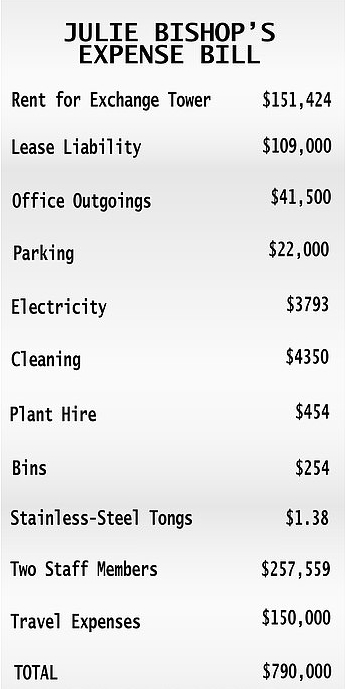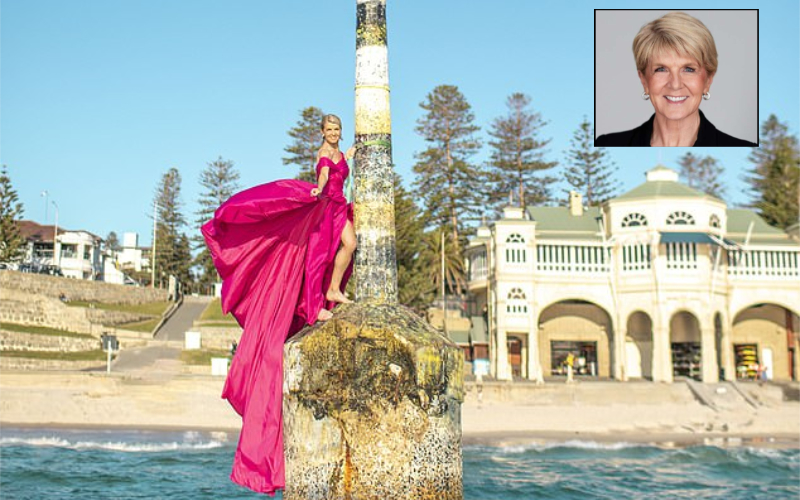Former Foreign Minister and Liberal deputy leader Julie Bishop has come under fire for conflicts of interest in combining academia with lobbying and being UN envoy for Myanmar. Andrew Gardiner reports.
Julie Bishop was never one to do things by halves. As Foreign Minister, the former Vogue cover girl donned a $32,000 designer gown to Canberra’s Mid-Winter Ball, used an otherwise empty RAAF jet to fly her and partner cross-country at a cost of $30,000, while jaunting to various points of the compass on the public purse to see rugby, racing, polo and, of course, her beloved West Coast Eagles.
But the retired politician isn’t pining for the past. Her income has rocketed since those halcyon days, and that’s not counting her $200,000 per year parliamentary pension.
Bishop continues to live and work in style. As Chancellor of the Australian National University in Canberra since 2020, Bishop’s office digs are the utmost in opulence after the ANU shelled out nearly $800,000 to spruce up her office in the 40-storey Exchange Tower on The Esplanade in Perth, her hometown.

Julie Bishop’s expense bill 2024. Image courtesy vibewire.com.au
It boasts panoramic views over the Swan River and costs ANU a further $150,000 per year in rent. In total, Julie Bishop cost the ANU $790,000 in 2024, according to VibeWire.
She has also been criticised for being generous to friends on behalf of her employer. As chancellor, Bishop awarded ANU contracts to the firm of Murray Hansen, her former chief of staff and now principal at Julie Bishop and Partners, a lobby shop and private consultant.
Some ANU academics were aghast at all this profligacy. “It is completely unacceptable for Julie Bishop to raid the ANU piggy bank to give money to her mates, while at the same time, ANU is sacking staff because of financial mismanagement,” Lachlan Clohesy, secretary of the ACT branch of the National Tertiary Education Union, said ($).
Oh, and in case she was missing all the international travel and global relevance she had as Foreign Minister, the UN ponied up by making Bishop its special envoy for Myanmar. She visited the Kremlin (below) in June, a rare privilege given Russia’s split with the West following its invasion of Ukraine.
While her honorarium as ANU Chancellor is just $75,000, Bishop’s real income these days comes from lobbying and the like. She received ($) US$600,000 from now-defunct Greensill Capital, which, coincidentally or not, was soon able to pitch ($) supply chain finance (over how public servants are paid) to former Prime Minister Scott Morrison.
Then there’s her lucrative gig ($) with Palladium International, one of the principal beneficiaries when Bishop shut down the government’s foreign aid agency and turned its budget over to private contractors. “I’ve long believed the private sector is the key to lifting living standards”, she once said.
Following Bishop’s appointment to its board, Palladium raked in millions in COVID-19 delivery contracts (to the Asia-Pacific) under Morrison. Ministerial standards say former ministers are forbidden from taking “personal advantage of information to which they have had access as a minister, where that information is not generally available to the public”, although it’s unclear what role, if any, Bishop played in this.
The Myanmar connection
Perhaps the most vexing case of potential conflict comes from Bishop’s involvement with Energy Transition Minerals (ETM), where last year she was made Strategic Advisor, helping manage a dispute with Greenland over a stalled uranium mining project.
Why the potential conflict? ETM’s partner in the Greenland project, Shenghe Resources, has massive investments – currently hurt by an insurgency – in Myanmar, where Bishop acts as special envoy. The Justice for Myanmar (J4M) research group says this could push Bishop onto one side of a conflict in which she’s supposed to be an honest broker.
“(Bishop’s) role should exclusively involve working for a resolution to the crisis in Myanmar … yet her (links to Shenghe and ETM) raise serious questions over her ethical conduct and ability to successfully carry out that mission,” a J4M statement read. “China … provides the (governing Myanmar junta) with major sources of revenue, including from the mining sector, (thus) aiding and abetting ongoing war crimes and crimes against humanity.”
“Any commercial ties between (Bishop and China) are therefore alarming and call into question her ability to carry out her mission with integrity. The fact that the companies she’s linked to have a history of dirty deals with the Myanmar military makes her activities even more questionable”, J4M added.
No justice, and nowhere to go for the victims of Myanmar’s forgotten genocide
The “home office”
In a since-corrected filing snafu which laid bare her intricate web of post-politics enterprise, Bishop last year declared her ANU office in Perth to be both the address for her privately run lobby shop and, oddly, her “residential address”.
The blunder brought media scrutiny of Bishop, with the ensuing revelation that her two staff members in that office were also employed by her consulting firm.
It begs the question: Is academic administration all Bishop and her multi-tasking staff do in those plush surrounds? Bishop, at least, brings in far more income from her various lobbying roles than from ANU, and the offices of her consultancy (two of whose three employees work at ANU Perth) are more than 2,000km away in Adelaide.
The tyranny of distance – coupled with the financial incentive to, perhaps, stray onto work in the more lucrative pursuit – poses labyrinthine questions which drew headlines at a Senate Estimates hearing in February. Tony Sheldon (Labor, NSW) noted the potential “conflict of interest in prioritising work”.
MWM is not suggesting Bishop acted unethically or allowed any consultancy work to impinge on her academic or UN responsibilities, but questions nonetheless linger.
Sheldon said the Bishop revelations (and others elsewhere) expose universities like ANU as ‘lawless’. “There’s no other job in Australia where you can be paid so exorbitantly while performing so badly, with seemingly no consequences or accountability for the impact on university staff and students,” he said.
Those “consequences” include the potential loss of up to 650 jobs, fewer available courses and more students per tutorial, all part of a planned restructure at ANU. Such belt-tightening comes as Bishop burns through cash, commuting to Canberra from our farthest-flung state capital.
A parliamentary review of university governance announced in January will see prominent vice chancellors grilled about governance and management failures at ANU and elsewhere. That, plus a drip feed of leaks, damning public statements, allegations of bullying and a 95 per cent vote of no confidence by more than 800 ANU employees, is not a good look.
Of course, retiring L-NP politicians don’t have exclusive boarding rights to the post-parliamentary gravy train. Lest we forget Labor’s PM-who-wasn’t, Bill Shorten, now bringing in over a quarter of a million dollars more as Vice Chancellor at the University of Canberra than he ever would have had he made it to The Lodge.
Both sides do it. But perhaps Julie Bishop – she of the stunning pink designer gown, clinging to a bell pylon off Cottesloe Beach – does it with more style.
Academy of Science, ANU compromised by government secrecy over damning emissions report
An Adelaide-based graduate in Media Studies, with a Masters in Social Policy, I was an editor who covered current affairs, local government and sports for various publications before deciding on a change-of-vocation in 2002.

